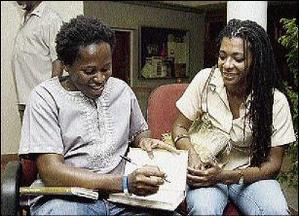Petrina Francis, Staff Reporter

Ishmael Beah, author of the book 'A Long Way Gone' and former child soldier in Sierra Leone, signs a copy of his book for Bertina Macaulay, actress and native of Sierra Leone, after speaking of his experiences as a youth. Beah gave a message of hope and triumph at the Undercroft at the University of the West Indies, Mona campus, Tuesday evening. - Peta-Gaye Clachar/Staff Photographer
Ishmael Beah went to hell and back as a child soldier who participated in one of the most brutal wars in the country of his birth - Sierra Leone, West Africa.
He could have continued a life of guns, drugs and murder but instead made a turnaround and is now travelling the world, empowering young people who have been in similar situations.
At the age of 13, Beah, whose parents and two brothers were killed during the Sierra Leone civil war, was forced to take up arms and kill.
At age 16, with the help of the United Nations Children's Fund (UNICEF), he was able to salvage his life.
Severely traumatised
Beah, 27, who arrived in Jamaica on Monday for a two-day visit, said he was severely traumatised by his experiences as a youth. He wrote a book entitled A Long Way Gone - Memoirs of a Boy Soldier, which was published last year.
"I decided to write this book because I felt that it was something important that I had to do. It is a responsibility to make sure that people don't forget about issues affecting children," Beah told The Gleaner during an interview yesterday at UNICEF's Kingston offices.
He said another purpose was to begin to change how people view children who were engaged in violent situations.
"My work is to empower young people and to empower people who are doing the work, and try to convince politicians that we have to take care of the younger generation." Beah said otherwise, future leaders would have no moral standards. "... And that would be a very dangerous world."
Beah was taken to the United States in 1998 by his adoptive mother, whom he met on a trip to New York, to tell his story at the United Nations Economic and Social Council.
He completed his last two years of high school in New York and graduated from Oberlin College in 2004, where he studied political science.
"After coming out of the war where I was for over two years, and being extremely lucky to live through that war and go overseas to study, I began to realise that there was a responsibility that comes with the extraordinary luck that I have been able to get to survive and to be alive and to have an education," he said with a smile.
Beah says with rehabilitation and the necessary support, individuals who take on a life of crime can make the change.
petrina.francis@gleanerjm.comk

